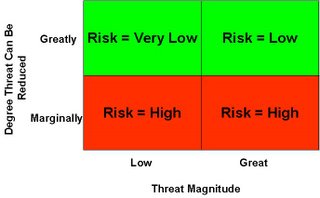
"The dinosaurs became extinct because they didn't have a space program. And if we become extinct because we don't have a space program, it'll serve us right!" --Larry Niven
Captain’s Quarters points out a fairly good ‘dead tree’ media piece on the threat of killer asteroids. In the UKGuardian article there are the obligatory ‘experts caution’ kind of references - to try and play down any hysterics from earlier citing unprovable statistics I guess – but on the whole it is a pretty good writeup (especially so, considering the source).
The Captain closes with “but let's make sure we're tailoring the budget and the mission to the real threat, and not some hysterics intended to sell books and buy tax money”, and I agree.
So how do we think about the ‘real threat’? Risk management techniques were made for this kind of easy example. We don’t even have to deal with nuances.
First, what is the ‘risk’ to us from such an event? Generally speaking, and without considering action and intervention, ‘Risk’ is a two-dimensional concept. To characterize it we must assess the probability of an event happening and the consequences of such an event if it did happen.
 Given what we know: a. we’ve been hit before and b. we don’t always see them coming, I can think of no reason to characterize the near-term risk of a killer asteroid in any way other than ‘low probability – dire consequences’ = taking no preparation against a possible ‘killer asteroid’ should be considered ‘High Risk’.
Given what we know: a. we’ve been hit before and b. we don’t always see them coming, I can think of no reason to characterize the near-term risk of a killer asteroid in any way other than ‘low probability – dire consequences’ = taking no preparation against a possible ‘killer asteroid’ should be considered ‘High Risk’.But we should and would intervene and take action if we could wouldn’t we? How fast could a threat appear and how fast can we come up with a way to deal with it? These factors can modify the ‘Risk’. Again, a simplified risk chart can illustrate the importance of the time factor:

Since large astronomical bodies have been first observed as they have already passed their closest point, and we don’t always get a long look at inbound threats we do see ahead of time, the speed the threat can materialize has to be considered ‘Quickly’. Since we haven’t developed a counter to the threat yet, and any program you can conceive will take longer to develop than the time it takes for one of these things to appear, the 'Risk' can still be considered 'high', even if we start developing a counter today.
When we DO develop a counter to the threat, how effective must it be to reduce the 'Risk'?

Since we already characterize the raw threat as ‘Great’, unless whatever counter we come up with is VERY effective, we (as in the whole freakin’ Earth ‘we’) will still remain at a high risk to a cosmic collision.
There are a lot of 'more probable' things that we have to worry about, but none have a greater consequence than wiping out the planet surface and current ecosystem in the blink of an eye. So stop fretting over unverified ‘man-made global warming’ and tell me why we don’t have a full time deep space watch and a long range counter-asteroid system yet?
No comments:
Post a Comment
Older posts are moderated only to keep the spambots and time wastrels away. If you are not a spambot or a wastrel, your comment will be posted. Egregious behavior and abusive comments will be initially critiqued. Persistence in egregious behavior and abusive comments will be cut off as deterrence to time wastrels.
Added 28 Sep 13: Comments without specific reference to subject posts that contain links to commercial enterprises also unrelated to subject post will be summarily deleted and reported as SPAM